10 Things You Probably Didn’t Know About Hemp
 By Penguin CBD
By Penguin CBDIn 1937, the Marihuana Tax Act made all cannabis plants illegal in the United States, which effectively made hemp illegal on a technicality, despite it having 0.3 percent or less of the psychoactive substance THC. Then in 1970, during the War on Drugs, the Controlled Substances Act was passed, in which industrial hemp was made illegal more formally.
Making hemp illegal was an unfortunate move in many ways, as it is a healthy substance for both human consumption and the environment. With cannabis legalization moving forward in many U.S. states, industrial hemp was finally relegalized in 2018 with the passing of the Farm Bill.
The Farm Bill has only made hemp legal for farmers to grow, so the conditions are limited. It is still illegal to grow hemp in your backyard, for instance. Nevertheless, this step forward will lead to remarkable things for the world.
Here are 10 facts about hemp that will help you recognize just how useful it is. It can be grown both for fiber and seed, making it a highly versatile substance. This one plant can solve many of the world’s problems all by itself.
1. The environment is happier with hemp than cotton
Growing cotton requires twice as much land per ton as hemp. Conventional cotton also uses 25 percent of the pesticides used globally. Hemp, on the other hand, can be grown without using any pesticides. Pesticides pollute the environment, making hemp a much cleaner alternative for making clothes than cotton.
What’s more, cotton uses 50 percent more water each season than hemp. Hemp doesn’t require much irrigation at all. Cannabis encompasses both the marijuana and hemp plants, which are the same plant, only differing in their THC content.
Unfortunately, a lot of the world’s cotton is grown in places where there isn’t a lot of water to begin with, like Texas, certain dry regions of China, and Egypt. This means an irrigation system must be put in place to transport water to the cotton plants, which requires energy and creates pollution.
Cotton also requires water to be processed. It takes four times as much water to process cotton as hemp. All in all, using hemp as an alternative to cotton would be much easier on the environment.
2. It’s good for you
Hempseeds are nutritious, even more so than flax and chia. They have lots of vitamins A, B, D and E. They also have many essential proteins, fatty acids and minerals. Hempseeds are considered a superfood and a marvel of nature for their potent antioxidant, antibacterial, antimicrobial and anti-inflammatory properties.
Interestingly, hempseeds also contain the same nutrient found in breast milk: gamma-linolenic acid (GLA). Hemp oil has high amounts of both omega-3 and omega-6 fatty acids, so it’s better for you than most vegetable oils.
3. It enriches the soil
Hemp can grow in diverse terrains and soils because its roots penetrate deeply into the earth. Its root system helps hold the soil together, augmenting its microbial content and feeding nutrients back into the earth.
On top of that, the leaves and stems of a hemp plant hold a ton of nutrients. What isn’t used when harvested gets redeposited into the soil, further revitalizing the land. Typically, plants tend to deplete the soil of nutrients, meaning they have a harder time growing the following year. Many farmers must rotate crops every year, but this is not the case with hemp. Healthy soil means the yield the next year will not suffer.
A truly amazing thing about hemp is that it can be used to decontaminate both soil and water when industrial accidents and general pollution occur. When hemp grows in contaminated soil, it can absorb toxins and heavy metals into the plant. It was even used for this purpose after the nuclear disaster in Chernobyl in 1986.
4. It cleans the air
Aside from being great for the soil, hemp plants can also clean the air. Climate change, caused by the large amount of carbon dioxide we produce, reaches dangerous levels that threaten to destroy life as we know it on this planet.
Hemp can potentially reverse this damage. It absorbs four times more carbon dioxide than trees. It is also a sustainable crop because of its short growing cycle and ability to replenish rather than deplete the earth as it grows.
5. It helps cut back on deforestation
Hemp can be used to make paper, and using hemp to make paper would significantly reduce the world’s deforestation problem. Just one acre of hemp can produce as much paper as four acres of trees. Trees are much harder to replenish than hemp, as they take a lot longer to grow. If we made paper with hemp, we would not need to cut down as many forests. In short, hemp can help save the trees.
Hemp can also be used to make other products normally made from wood (building products, for instance), further decreasing our reliance on trees. This would help the earth and the population immensely.
6. It could solve world hunger
Because of how nutritious it is and how sustainable and fast it is to grow, it is possible that hemp could solve world hunger. Hemp is jam-packed with protein, making it the healthiest meat alternative in existence. A lot of world hunger issues are caused by protein-energy malnutrition. It is the deadliest type of hunger in the world.
By weight, hempseeds have the same amount of protein as beef. Thirty grams of hempseeds, only two to three tablespoons, supplies around 11 grams of protein. On top of that, hempseeds are also calorie rich.
Countries facing starvation could use hemp as a food staple to solve this problem. This becomes even more feasible when we recognize that hemp can be grown in a wide range of climates.
7. Replacement for plastic
Plastic has become a huge problem on this planet, filling up landfills and the oceans more as each year passes. It takes a lot of fossil fuels to make plastic, so it’s polluting the earth in more ways than one. With the looming climate-change crisis threatening the environment, and the health of humans and animals, continuing to produce and consume plastic as we do is not sustainable.
That’s where hemp can save the day. The stalks of a hemp plant are a fibrous material that can be used instead of plastic to make all sorts of things. These include composite panels, car parts, doors, window frames, floors, and plastic bottles and containers.
Unfortunately, plastic made from 100 percent hemp is still uncommon. Bioplastics, which are composite plastics made partially from hemp and other plant materials, are more common, but bioplastics can’t solve the plastic pollution problem the world is facing.
However, until governments halt fossil fuel subsidies that keep the production of normal plastic cheap, hemp-based plastic will remain expensive and inaccessible as a viable alternative.
Hopefully, the price of hemp will come down as countries begin to act against climate change, and then we can expect to see hemp replace plastics more often. It is already happening to some degree. LEGO has promised to end its reliance on fossil fuels by 2030 and is looking at hemp as an alternative to make its famous plastic toys.
8. It will not get you high
Marijuana and hemp are both varieties of the cannabis plant, but there is one critical difference. Agricultural hemp contains only trace amounts of THC, the natural chemical compound with psychoactive properties that makes users feel “high.”
By definition, hemp can only have up to 0.3 percent THC, which will not get you high. Marijuana has lots of THC, which is why it is known for its psychoactive effects.
THC is not the only compound found in cannabis plant varieties. However, both hemp and marijuana have another substance called cannabidiol, or CBD. Hemp can have fairly large quantities of CBD. With the Farm Bill's passing in 2018, legalizing industrial hemp, CBD derived from hemp became legal along with it.
A variety of CBD products, including CBD oil, gummies and capsules, are now produced by many companies around the U.S.
Both early scientific research and loads of anecdotal evidence have brought to light impressive information about CBD's effects on the body. Ask any regular CBD user, and they’ll probably rave about the relaxing feelings that CBD can bring.
9. It’s a fuel source
Research from the University of Connecticut found that hemp shows real potential as a sustainable fuel source. Part of what makes hemp sustainable is that it is a renewable plant source and it grows quickly in infertile soils, freeing up the primary soil for food crops that need it.
The study used virgin hempseed oil to create biodiesel fuel. Upon testing it, the hemp-derived biodiesel showed that 97 percent of the oil was converted to biodiesel. Furthermore, it could be used at a lower temperature than all other biodiesel fuels we currently use.
It is imperative that we find renewable energy sources, as fossil fuels have been a large contributor to the climate-change problems the world is facing.
Using clean energy will help keep global temperatures down to avoid future catastrophic climate events, including sea-level rise, an increase in natural disasters and transforming currently habitable regions into places no longer suitable for humans to live. Hemp can play a crucial role in saving the planet as a sustainable, renewable fuel source.
10. It helped the Allied Powers win World War II
In 1939, during World War II, Japan cut off certain American supply chains with Asia. This meant the U.S. could no longer import hemp from the Philippines and India, and by 1942, their supply of bulk war materials was not in good shape. Despite the U.S. prohibiting hemp production starting in 1937, an exception was made out of military desperation.
The government began a Hemp for Victory program, urging farmers to grow industrial hemp for war supplies, like naval towlines, parachute webbing and shoelaces. It even included a primer on how to plant, reap and bundle hemp, plus tips about what equipment to use and how to bind rope.
This led to masses of patriotic farmers stepping up to the plate and growing enough industrial hemp to help the Allied Forces defeat the Nazis and the other Axis Powers, ending World War II.
The wind-up
This list could go on and on. For instance, in 1941, Henry Ford made a car out of hemp, soybean and plastics. You’d think a car like this would not be exceptionally durable, but the opposite was true. Despite being lighter than steel, it could withstand up to 10 times the impact without leaving a dent. Go, hemp, go!
Many people think of hemp as a miracle crop, and they might just be right. It can be used to make a wide variety of products, including food, clothing, building materials, “plastic,” war supplies and even fuel.
What’s even more miraculous is that it can contribute to all of these things without destroying the planet. We here at Penguin CBD think that hemp is truly a sustainable, renewable gift from the earth that could save the world. If only we could use it to its full potential.










